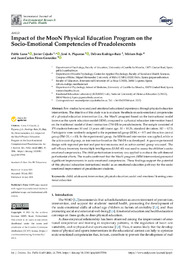Por favor, use este identificador para citar o enlazar este ítem:
https://hdl.handle.net/11000/36098Registro completo de metadatos
| Campo DC | Valor | Lengua/Idioma |
|---|---|---|
| dc.contributor.author | Luna, Pablo | - |
| dc.contributor.author | Cejudo, Javier | - |
| dc.contributor.author | Piqueras, Jose A | - |
| dc.contributor.author | Rodrigo-Ruiz, Débora | - |
| dc.contributor.author | Bajo, Miriam | - |
| dc.contributor.author | Pérez-González, Juan-Carlos | - |
| dc.contributor.other | Departamentos de la UMH::Psicología de la Salud | es_ES |
| dc.date.accessioned | 2025-03-24T16:17:47Z | - |
| dc.date.available | 2025-03-24T16:17:47Z | - |
| dc.date.created | 2021-07-26 | - |
| dc.identifier.citation | International Journal of Environmental Research and Public Health 2021, 18(15), 7896 | es_ES |
| dc.identifier.issn | 1660-4601 | - |
| dc.identifier.issn | 1661-7827 | - |
| dc.identifier.uri | https://hdl.handle.net/11000/36098 | - |
| dc.description.abstract | Few studies have analyzed emotional educational experiences through physical education interventions. The objective of this study was to evaluate the effects on socio-emotional competencies of a physical education intervention (i.e., the MooN program) based on the instructional model known as the sports education model (SEM), compared to a physical education intervention based on the traditional model of direct instruction (TM-DI) in preadolescents. The sample consisted of 170 students between 10 and 13 years old (mean age: M = 10.76; standard deviation: SD = 0.73). Participants were randomly assigned to the experimental group (SEM; n = 87) and the active control group (TM-DI; n = 83). In the experimental group, the SEM-based intervention was applied, while in the active control group, an intervention based on the TM-DI was developed. A quasi-experimental design with repeated pre-test and post-test measures and an active control group was used. The self-efficacy inventory for multiple intelligences (IAMI-40) was used to assess the children’s socioemotional competencies. The child perfectionism inventory was applied to evaluate the self-demand perfectionist efforts. The results confirmed that the MooN program (SEM intervention) promoted significant improvements in socio-emotional competencies. These findings support the potential of this physical education instructional model as an emotional education pathway for the socioemotional improvement of preadolescent students. | es_ES |
| dc.format | application/pdf | es_ES |
| dc.format.extent | 17 | es_ES |
| dc.language.iso | eng | es_ES |
| dc.publisher | MDPI | es_ES |
| dc.rights | info:eu-repo/semantics/openAccess | es_ES |
| dc.rights | Attribution-NonCommercial-NoDerivatives 4.0 Internacional | * |
| dc.rights.uri | http://creativecommons.org/licenses/by-nc-nd/4.0/ | * |
| dc.subject | child | es_ES |
| dc.subject | adolescent | es_ES |
| dc.subject | intervention | es_ES |
| dc.subject | physical education | es_ES |
| dc.subject | social and emotional learning | es_ES |
| dc.subject | emotional education | es_ES |
| dc.subject.other | CDU::1 - Filosofía y psicología::159.9 - Psicología | es_ES |
| dc.title | Impact of the MooN Physical Education Program on the Socio-Emotional Competencies of Preadolescents | es_ES |
| dc.type | info:eu-repo/semantics/article | es_ES |
| dc.relation.publisherversion | https://doi.org/10.3390/ijerph18157896 | es_ES |

Ver/Abrir:
2021_ijerph-18-07896 ppeq.pdf
568,59 kB
Adobe PDF
Compartir:
 La licencia se describe como: Atribución-NonComercial-NoDerivada 4.0 Internacional.
La licencia se describe como: Atribución-NonComercial-NoDerivada 4.0 Internacional.
.png)